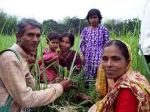Two articles I recently read highlight the need to listen to and provide support to farmers in India, especially women farmers.
The first article was a short piece in the New York Times on the use of a potent pesticide called Endosulfan, often referred to as “DDT’s cousin.” According to the Times, the chemical has been banned by many countries due to the dangers it posed to agricultural workers, “good” insects, and overall threat to wildlife and a healthy environment, yet only officially banned last week.
However, a 10-year exemption has been made for India, home of the Green Revolution, to phase out its use, because agriculture ministry officials fear a rise in prices. They state there are no cheap alternatives. Perhaps it is time to look beyond cheap prices and consider the well-being of living things. As I’ve mentioned before, women worldwide are keepers of seeds and protectors of biodiversity. It is a source that needs to be heard and respected. I’m eagerly awaiting a report-back from the Women’s Earth Alliance, who just held a training for and by female Indian farmers in northern India working to protect food security and food diversity. And others, most notably Vandana Shiva, have written about the work of India’s women farmers and their role in promoting organic alternatives.
I don’t think continued use of Endosulfan is worth the risk of deformed children, as has been reported in Kerala due to the use of this pesticide on cashew plantations. The ministry is wrong; there are viable organic alternatives to pesticide use, just maybe not big money-making ones for industrial agriculture and chemical companies.
The second article is an homage to small farmers, giving credit to Himalayan farmers as a source for coping with climate change. In a study by Britain’s Royal Society, the authors suggest that local knowledge may help climate and biodiversity researchers improve ways of tracking the impacts of global warming. And they were surprised by how much people notice biodiversity loss in their regions. The fact that they found it surprising surprised me. In my opinion, it makes sense that local knowledge trumps computer models.
We should continue using all the resources available to us, but not disregard local ways of doing things, as well as information passed down through generations. This applies to those working the land all over the world – men and women, old and young.

